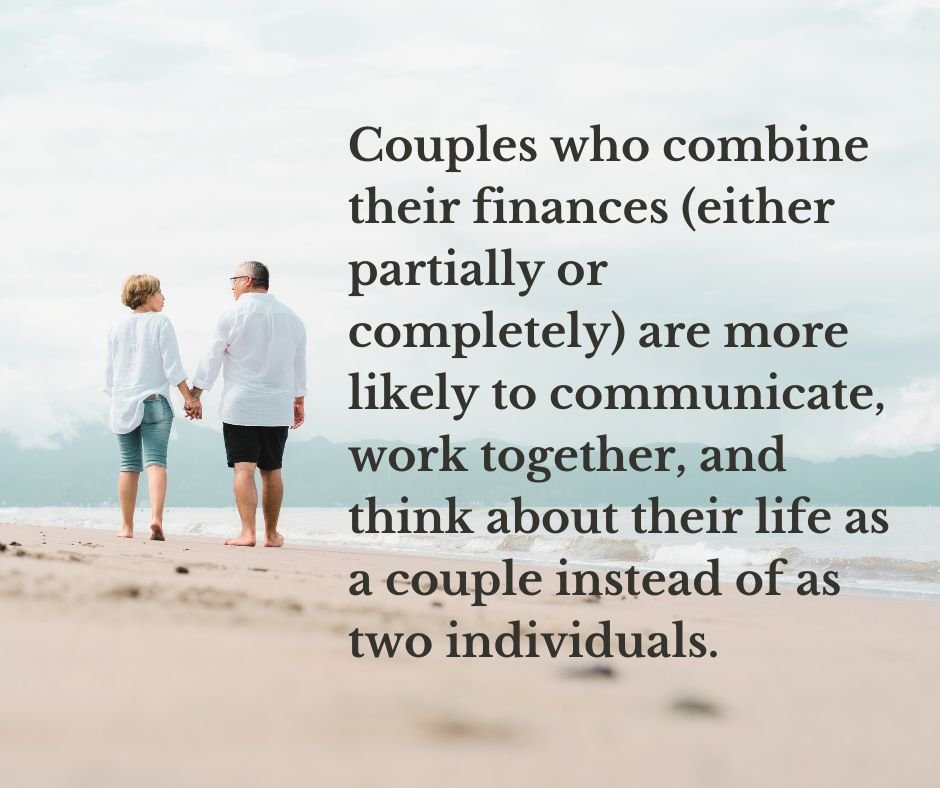Are Couples With Joint Bank Accounts Happier?
Tips to Help You Stop Fighting About Money and Start Creating the Life of Your Dreams
The question of how to combine finances in marriage is a question all married couples (or those in committed relationships) face at some point. Do you combine everything into joint accounts and joint ownership? Have “yours, mine, and ours” accounts? Keep everything separate?
It’s a complicated question because couples have had wonderful, happy relationships using all of these systems. Yet, new research from Indiana University Kelley School of Business indicates that combining your finances leads to a happier marriage.
Researcher Jenny Olson and her co-authors followed 230 newly or recently-wed couples over the course of two years. All of the couples started with separate finances. Some of the couples kept their separate accounts, some were told to open joint accounts, and others were allowed to decide on their own.
At the end of the two year period, the couples with the joint accounts reported greater happiness and satisfaction in marriage.
So does this mean that you should go online or drive to the bank and put all your money in joint checking and savings accounts?
Not so fast.
Many couples might see one of the many articles on this research and think that if they merge all of their money, their relationship will suddenly be better. But it is a mistake to believe that combining all of your money is a magic cure for the problems in your relationship. Many couples with joint accounts can attest to this reality.
People who’ve kept their money separate have had great marriages and couples who combine everything have ended up divorced.
When you dig deeper, it becomes evident that it’s not necessarily the joint bank accounts that improve your marriage, but what often happens with your mindset and relationship when you combine your finances.
Couples who combine their finances (either partially or completely) are more likely to communicate, work together, and think about their life as a couple instead of as two individuals.
Olson says, “When we surveyed people of varying relationship lengths, those who had merged accounts reported higher levels of communality within their marriage compared to people with separate accounts, or even those who partially merged their finances…They frequently told us they felt more like they were ‘in this together.’”
It’s not the joint bank accounts. It’s the mindset and the way you manage money as a couple that’s important. Joint bank accounts just make it more likely because they force you to talk about your finances and think about what you want to do together.
Ultimately, marriage is about generous love—loving each other to the point that you want to do things that make each other’s life better. It means going beyond trying to divide things up in a way that feels fair and equal, and committing yourself to this larger vision of your life together.
So how should couples manage their finances?
Having joint checking and savings accounts can be a good start, but you can’t stop there.
Here are 5 things you can do to manage your money together in a way that improves your relationship
1. Talk about money
One of the best ways to improve your relationship around finances is to talk about it more. Many couples don’t talk about money, and if they do, it ends in a fight.
This happens for a number of reasons.
Some couples avoid talking about money, especially before they get married, because money doesn’t seem romantic. In other relationships, one person takes over doing everything because they like it or the other spouse is too busy or doesn’t think they’re good at it. And sometimes, partners stop talking about it because they’re tired of the fights.
Talking about money is a skill that you must learn and practice.
If you’ve never done it, or you have and it doesn’t end well, try these tips:
Set a time and place where you both feel relaxed and comfortable. Don’t bring up tense topics when you’re both tired and overwhelmed. Consider involving your favorite food and/or drinks to make it feel more special. If you have kids, make sure they won’t interrupt.
Ensure that both of you are on the same page by examining the numbers together. Keep the conversation focused on the facts and refrain from making judgmental comments at this point.
Give each partner a chance to talk about their fears, dreams, values, and goals. You might even set a timer so that each person has an equal chance to talk. The partner who is not speaking may ask clarifying questions, but should not be adding their own thoughts during the other person’s time.
Focus on listening more. People often think they know what their partner thinks and feels when they actually don’t. Approach the conversation with curiosity. What can you learn about your partner?
Leave out the criticism and judgment. It’s easy to jump into the “you always do this…” or “you never…” or “why would you…?”, but things like that will never end well. Remember, this is a person who you love and respect. Show that! Seek understanding instead of going straight to the criticism.
2. Think like a couple
Being married is more than two individuals living together. When you get married, you are creating something that is bigger, or at least different, than two people on their own. If you want to stay married, you have to pay attention to your marriage almost like it is another person or entity. You have to nurture and care for it.
And that starts with thinking of yourselves as a couple.
I’m not saying that you should totally abandon your individual identities. You should absolutely be your own person. But you also have to think about yourself as part of a relationship.
This means that you will think about what is truly important to you as a couple and create a shared vision for your life together.
And yes, it means that you will have to compromise. Compromising does not mean that you’re going to give up everything you want for the sake of the relationship. It means thinking creatively together to find ways that you can both get at least some of what you want and figuring out how to get what you want as a couple.
This shouldn’t mean that you lose yourself as an individual. It just means that you might have to stretch yourself, be a little uncomfortable at times, and get really creative in finding solutions you both like.
Always remember, you got married because you were interested in sharing your future. Tap into whatever led you to be together in the first place. Dream about how you can create that together. Don’t forget that you are on the same side!
3. Identify your shared values and goals
As a couple, knowing your shared values and goals creates a strong basis for your relationship. It builds a sense of understanding and mutual respect and gives you something to work on together.
When you don’t have a vision for your life together, you are more likely to get wrapped up in the day-to-day, fighting about paying bills, getting out of debt, or who buys what.
Identifying shared values and goals helps prevent conflicts that may arise from differences in beliefs or priorities. For example, if one partner values family above all else, while the other prioritizes career success, conflicts can arise if they don't have shared goals that accommodate both perspectives.
Couples who know what is important and have a shared vision are less likely to get into fights and more likely to achieve their goals because they are on the same page.
Want help identifying your values? Click here to get a free guide and worksheet.
4. Manage your money together
Both partners absolutely must be equal partners when it comes to managing the money. It’s okay if one person sets up the bill pay or updates the spreadsheet, but both partners must:
Know how much money comes in, where it goes, how much you have, and where it all is
Be able to access and log in to all joint accounts
Be equally involved in reviewing spending and making plans for the future
Participate in money decisions, particularly when it comes to priorities, large purchases, debt, and investing.
Besides being good for your relationship, this reduces the chance that one partner will hide money, make bad financial decisions, or engage in financial infidelity (hiding money and/or purchases).
It is also critical because sometimes a spouse dies or becomes incapacitated and the surviving spouse needs to know how to manage the money.
I recommend that partners sit down together at least once per month (or weekly if money is tight and you’re struggling to get by). During this time, spend a few minutes reviewing the past month/week. Then talk about upcoming expenses and make a plan for how you’ll pay for those. Then check in on your goals to see what progress you’ve made and decide if you need to make any changes or adjustments.
5. Set some money guidelines
Many fights over money occur because there is a lack of clarity around what is expected. The more you talk about money, the less this should happen. But if all of your conversations end in conflict, it’s a good idea to set some clear guidelines.
Here are a few areas where guidelines could be helpful:
Which partner is responsible for paying the bills or making sure the autopay went through
Who is responsible for updating the budget numbers and how often it happens
Which things are paid from the joint account vs individual accounts
How much a spouse can spend without having to discuss it with the other person
How much you want to devote to the things that are important to you as a couple
What percent or amount each of you contributes to the joint expenses
In the end, the most important thing when it comes to money and relationships is that you approach each other with radical love and generosity. When partners think of themselves as individuals, it often means that each person is thinking about themselves at the expense of the other. It leads to one or both partners thinking about what they are giving up for the sake of the other person.
Instead, you have to think about what you can do together. You have to approach your marriage in the spirit of “how can we win together.” How can we create our best life by combining our time, energy, talents, and money so that both of us can succeed together?
Discussing these topics will take time, practice, and patience, but doing so can lead you to a whole new level of intimacy in your relationship and help you build the foundation for a long, loving, and respectful marriage.
Final thought for those who are struggling in their relationship:
You might be thinking that this sounds idealistic and impossible. I promise you it is not impossible. However, both partners must be on the same page and must be approaching it with the same mindset. It absolutely cannot be that one spouse is thinking as part of a couple and the other is not.
I have many friends who are struggling because their spouse isn’t helping around the house, doesn’t participate in the mental workload, and gets defensive when asked to do more.
Sometimes these problems can be resolved with couple’s counseling. A financial coach can also be helpful in facilitating conversations around the money aspects and helping couples get on the same page.
But in the end, both partners have to be willing to commit to trying and be open about changing the way they talk and think about money together. And sometimes that just isn’t the reality.







